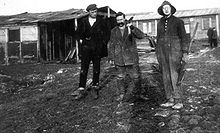
Youth For Understanding (YFU) is an international educational exchange organization. A network of over 50 independent national organizations worldwide, YFU representatives work together to advance learning across cultures.
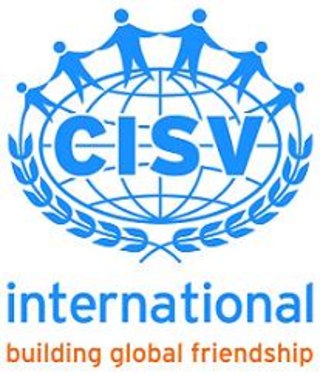
CISV International was founded in 1950 by Dr. Doris Twitchell Allen and aims to educate and inspire action for a more just and peaceful world.

International Student Week in Ilmenau is a student conference, held biennially in the town of Ilmenau, located in the district of Ilm-Kreis, Thuringia, Germany.
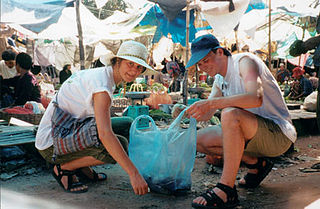
Service Civil International (SCI) is an international peace organisation, founded by Swiss pacifist Pierre Cérésole in the aftermath of World War I to foster understanding and a culture of peace between people from different countries. Since 1920 SCI has organised international volunteering projects in the form of workcamps and has expanded to have branches in 40 countries, as well as partner organisations who help run the projects.

The European Solidarity Corps (ESC), known until 2016 as European Voluntary Service (EVS), is an international volunteering program by the European Commission for young people to go individually or in teams to another country, usually from one European country to another, to work for a non-profit cause. Since 2017, the program also offers opportunities for European youth to get engaged as volunteers in their own communities.
Apprentices mobility is the movement of students and teachers in vocational education or training (VET) to another institution inside or outside their own country to study or teach for a limited time. The term is usually used in the context of European Union (EU) policy.
The Brynmawr Experiment was an effort led by the visionary idealist Peter Scott to address issues of poverty and unemployment in Brynmawr, South Wales, between 1929 and 1939. Initially a relief project response of the Quakers in South-East England, it grew first into an effort to set up small industries and finally an ambitious utopian subsistence agriculture project for unemployed workers.

Youth for Exchange and Understanding (YEU) is an International Non-Governmental Non-profit Youth Organisation established in 1986 and member of the European Youth Forum in Brussels. YEU is recognized by the Council of Europe and the Directorate of Youth and Sports of the European Commission. YEU has its Head Office in Brussels, Belgium and a second office in Faro, Portugal from where it coordinates a network with more than 27 member organisations from Europe and North Africa. YEU is a non-profit International Youth Non Governmental Organization (IYNGO) independent of all political affiliation.
Regardless of political or religious convictions, the Arbeitskreis gemeinnütziger Jugendaustauschorganisationen (AJA) is the umbrella organisation of non-profit youth exchange organisations in Germany that engage in the promotion of long-term student exchange as a means for intercultural understanding. In IJAB, the German department of international youth work, AJA is the only organisation that represents long-term student exchange.
The Action Reconciliation Service for Peace is a German peace organization founded to confront the legacy of Nazism.

European University Sports Association (EUSA) is an umbrella non-governmental (NGO) non-profit organisation, working in the field of university sport in Europe.
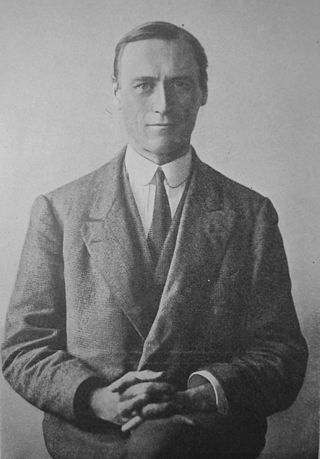
Pierre Cérésole or Ceresole was a Swiss pacifist, remembered for founding the peace organisation Service Civil International (SCI) and the international workcamp movement.
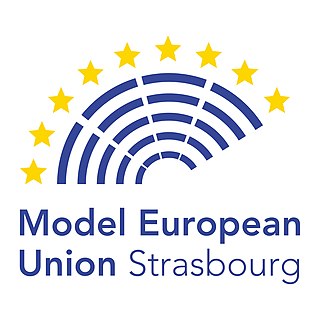
Model European Union Strasbourg (MEUS) is the original simulation of the European Union's legislative process organised by BETA France. It was initiated in the spring of 2007 by a group of university students and gathers around 180 young people from across Europe in the Seat of the European Parliament in Strasbourg, France annually.

International Voluntary Service (IVS), formerly International Voluntary Service for Peace (IVSP), is the British branch of the Service Civil International (SCI). Founded in 1931, IVS promotes peace through volunteering, both in the United Kingdom and other countries.
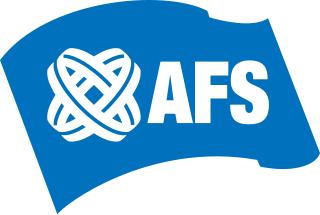
AFS Intercultural Programs is an international youth exchange organization. It consists of over 50 independent, not-for-profit organizations, each with its own network of volunteers, professionally staffed offices, volunteer board of directors and website. In 2015, 12,578 students traveled abroad on an AFS cultural exchange program, between 99 countries. The U.S.-based partner, AFS-USA, sends more than 1,100 U.S. students abroad and places international students with more than 2,300 U.S. families each year. As of 2022, more than 500,000 people have gone abroad with AFS and over 100,000 former AFS students live in the U.S.
VolTra is a voluntary non-governmental organization, registered as a charitable institution in Hong Kong. VolTra is dedicated to promoting international voluntary services in Hong Kong through a well-established worldwide network of international workcamp organizations. VolTra is an official member of CCIVS, which stands for Co-ordinating Committee for International Voluntary Service.
International volunteering is when volunteers contribute their time to work for organisations or causes outside their home countries. International volunteering has a long association with international development or environment, with the aim of bringing benefits to host communities. It can include a range of services, from healthcare advancement to economic development to governance.
Volunteers Initiative Nepal (VIN) is a volunteering in Nepal non-governmental organization (NGO) established and registered in 2005 in Kathmandu, Nepal by a group of social activists, educationalists, development workers, and other professionals. VIN is a non-religious, non-political, and non-profit organization. VIN focuses on empowerment projects in marginalized communities of Nepal through its programs and projects VIN mobilizes local and international volunteer in Nepal and interns in developmental and humanitarian projects including research, education, training, and counseling.
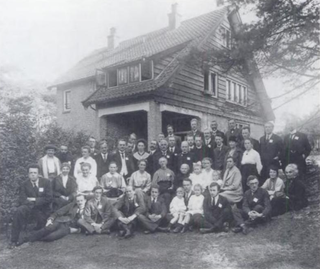
The Bilthoven Meetings were a series of networking and capacity building meetings of pacifist activists after World War I in the town of Bilthoven in the Netherlands. The activists gathered under the name of Movement Towards a Christian International, which was later renamed to International Fellowship of Reconciliation. The meetings took place at the house of Kees Boeke, a Quaker missionary and pacifist.

Hélène Monastier was a Swiss peace activist and teacher in Lausanne.

